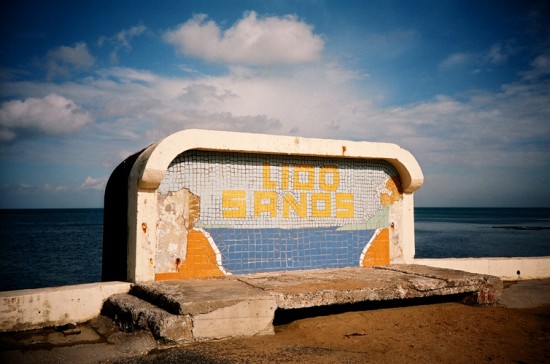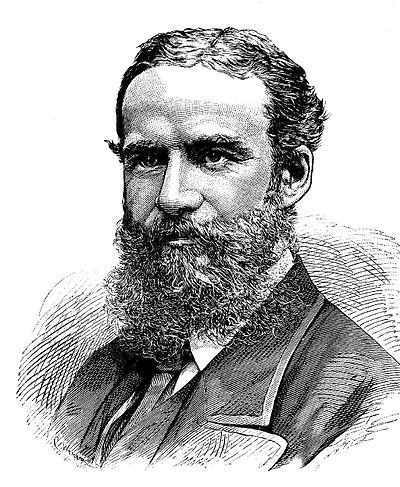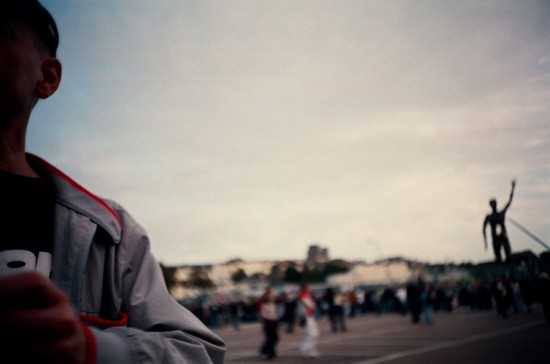
by Travis Elborough.
May Day. A holiday and a distress signal. Were, I found myself wondering recently, the pagan rites of this ancient seasonal celebration so distasteful to this isle’s Christian usurpers, that they maliciously set about repurposing its name for maritime disasters and, later, free falling airplanes? Probably. Edward Woodward as Sergeant Howie, predictably, sprang to mind. And at this time of year, the watching of The Wicker Man surely seem almost as much of a May Day ritual as the rituals of May Day themselves. All of these thoughts were churned up by being on the Kent coast this month. I’d gone ostensively to visit the new Turner Contemporary Gallery in Margate. But as the paperback of my book about the seaside had just come out, I also decided to undertake a kind of secular pilgrimage to nearby Kingsgate Castle.
Set above Kingsgate Bay, whose eroded grey-white chalk cliffs have the look of a severely gnawed wedding cake, the Castle is an 18th century mock fortress with several later additions and long since divided up into private flats. It was, however, the coastal residence of Sir John Lubbock. A classic frock-coated, full-bearded Victorian philanthropist, Lubbock was a banker, cricket fan, amateur biologist and the Liberal MP for Maidstone. A free-thinker in the vain, say, of Lord Summerisle’s grandfather, he grew up with Charles Darwin as a near neighbour. Spurred on by the evolutionist, he went on to write several books on the natural sciences, among them an influential study of ants, bees and wasps. (Mining bees and digger wasps are plentiful in this corner of the North Kent. Their presence confirmed by the hundreds of tiny bore holes that pockmark the cliffs at Reculver, a bay or so over at Herne.)

As a parliamentarian, Lubbock was behind a slew of progressive measures that included securing a reduction of the working week for shop staff and helping to establish public libraries. A passionate advocate of voting reform he also founded The Proportional Representation Society back in 1884. If his own party are now complicit in the (likely) destruction of the very libraries he fought to create and his dreams of a more representative parliament were busily being dashed as I was clambering along the beach, spotting sandpipers and ringed plovers, then another of his innovations, the Bank Holiday, has been almost unavoidable this spring. But it was the masses that mattered to Lubbock. His Bank Holiday Act of 1871, initially drafted to ensure that inky-fingered Bob Cratchetts up and down the land, got at least four days off a year, can be seen as the making of the seaside as we know it. So many of its most quintessential elements – from eating fish and chips (a dish hailing from the metropolitan backstreets) to paddling in the shallows (a neat way of avoiding bathing fees)- only arrived in the wake of bank holiday-making trippers.
Lubbock, fittingly perhaps, died in Kingsgate in 1913. I toasted his achievements with a pint in the Captain Digby, the pub on the cliff top historically frequented by smugglers, and looked in vain for turnstones around the bay before heading to Margate.
In the Turner and contemplating Turner’s The Eruption of the Souffrier Mountains, an astonishing painting of a darkly satanic volcano spurting jets of molten lava, I recalled coming to Margate five or six years ago for Artangel’s Exodus event. Standing on a piece of wasteland beside the sorely decrepit Dreamland amusement park, I’d watched as a giant wicker man designed by Antony Gormley was set alight, the flames quickly rippling through the wood and casting an eerie orange glow over the assembled crowd. My memory is a little shaky but I am sure that happened in May. What it also sparked was the idea that perhaps I should write something about the seaside, about its darkness and its light, its sublimity and its ridiculousness. But then I guess, it’s a fertile time of year.

…
Jonny Trunk, that modern antiquarian of library music and film scores and a man who knows how to wear a knitted tie, issued Paul Giovanni’s soundtrack to The Wicker Man in the late 90s. His own new single for Ghost Box’s Study Series, Animation and Interpretation, arrived just before I left for Kent. Its two instrumental tracks, La Traine Fantome and Cardboard Boxford, stuffed with cranky analogue samples, feel almost crafted in sticky-backed plastic.
Perhaps even better, though, was its accompanying series sibling from Hintermass. The a-side Are You Watching, in particular, mines a vein of whoozy, melancholy English pastoral pop brilliance that has lain dormant since Julian Cope abandoned his turtle shells for SS caps.
‘Elborough is an English nostalgist in the mode of John Betjeman… as a cultural commentator [Elborough] is a terrific companion… Wish You
Were Here is quirky, chatty, charming and optimistic – an ideal read for the English beach.’ Sunday Times
myspace.com/traviselborough
And if you have time to waste… here are some snaps flickr.com/photos/mylifeinlomo/